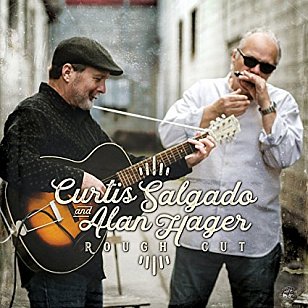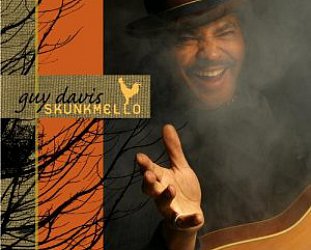Graham Reid | | 1 min read
I Will Not Surrender

Elsewhere has doubtless made this observation previously but it remains true: the blues gets little airplay, there are few enough albums released (and consequently sold) yet whenever a decent blues band or solo artist turns up in New Zealand they can always pull an audience.
There is a musical demographic out there which appreciates the blues – although it does seem to be aging.
And yet . . .
So we salute New Zealand's Southbound for continuing to import albums on Chicago's Alligator Records, a label which has held the blues banner high for more than four decades starting with greats like Hound Dog Taylor and the House Rockers, Koko Taylor and Li'l Ed and the Blues Imperials right through to the recent Tinsley Ellis album which we strongly recommend.
Singer-harmonica player Curtis Salgado originally from Oregon – here with guitarist Alan Hager also from that state – was a traveller in the band with the young Robert Cray and appeared on his first album, sang with Santana for a wee while and incidentally is credited with prompting the Blues Brother to make their movie.
More importantly he has picked up a swag of blues awards – about a dozen since signing to Alligator in 2012 – although in some ways he is different from many artists on the label. Most are tough urban blues stylists but Salgado and Hager here offer a more rural and acoustic take on the idiom.
Alongside originals (including his canine appreciating I Want My Dog to Live Longer) they address Muddy Waters' I Can't Be Satisfied, Son House's Depot Blues, the traditional Morning Train and You Got To Move, and Sonny Boy Williamson II's Too Young to Die.
Some of these will be familiar to rock listeners from Rolling Stones' versions.
Here these songs are powered right down to essentials in Hager's acoustic playing and slide work, and sixtysomething Salgado's lived-in vocals which show a keen understanding of the history he is singing.
A few guests are discreetly deployed (the soul-filled sound of singer Larhonda Steele on the country spiritual sound of Morning Train, pianist Jim Pugh on the swinging original One Night Only) and the opener, another original by them, I Will Not Surrender is a powerful, brooding journey down to the swamp for a song and sentiment which sounds centuries old.
On another original Hell in A Handbasket where Salgado plays piano he almost sounds like he is channeling the blues spirit of Mose Allison.
There is fine playing and some sound interpretations here alongside good originals, but blues aficionados need to know this is for sittin'n'listenin', not a knock-back-a-Jack night howler.
For more blues at Elsewhere start here.





post a comment